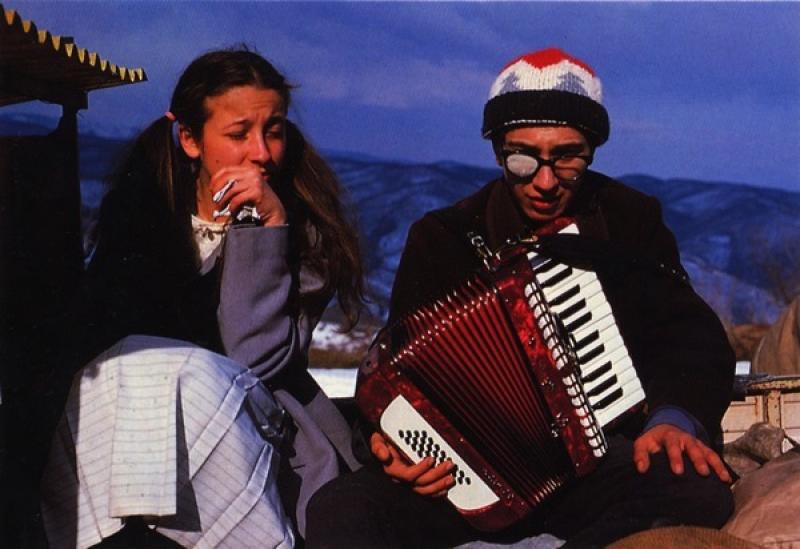DVD: Time of the Gypsies | reviews, news & interviews
DVD: Time of the Gypsies
DVD: Time of the Gypsies
Emir Kusturica hit the heights with his compassionate celebration of a Roma community in the former Yugoslovia

Born in Sarajevo, the capital of Bosnia-Herzegovina, into a secular Muslim family with Orthodox Slavic roots, the filmmaker Emir Kusturica has long been a polarizing figure in the Balkans.
Time was – before his second Palme d’Or-winner Underground (1995) presented the region as a politically obfuscating madhouse – when Kusturica’s reputation was less muddy. Stateless at the time of the war, he must have identified with the Roma whose lives of permanent outsiderdom he had depicted in Time of the Gypsies.
Honking geese, an enigmatic Greek chorus, show up in most of the scenes
Compassionate but unsentimental, the 1988 classic proceeds from a raucous celebration of young love, subsistence living, and Roma traditions in a ghetto outside Sarajevo to an angry critique of corrupting assimilation.
Accompanying his crippled younger sister to Ljubljana where he hopes she’ll be healed, the orphaned, telekinetically-gifted Perhan (Davor Dujmović) is lured from his loving girlfriend Azur (Sinolička Trpkova) and his doting grandma Khaditza (Ljubica Adžović) into a life of street crime by a flash Gypsy criminal (Bora Todorović), who traffics in babies and runs child prostitutes and beggars in Milan. That the villain and his equally venal brothers are Moslems discolors what is otherwise Kusturica’s most humanistic film.
Deeply indebted to the festiveness, ribaldry, and dense mise-en-scène of Fellini’s Amarcord, and similarly introduced by a barmy narrator, the freewheelingly poetic movie veers, unexpectedly on occasion, into scenes of delicate magical realism or hyperbolic surrealism. Honking geese, an enigmatic Greek chorus, show up in most of them.
It’s been suggested that Kusturica began to lose control of his stories at the time he made this film, but the structural and compositional chaos admirably reflects the Roma’s paganistic communal energy. It builds to a spine-tingling crescendo in the St. George’s Day (or Đurđevdan) renewal ritual on the torch-lit river, set to composer Goran Bregović’s haunting arrangement of the Gypsy folk song “Ederlezi”, when Perhan and Azur first make love. Once heard, its Macedonian singer Vaska Jankovska is never forgotten.
Below: the St. George's Day celebration
rating
Share this article
The future of Arts Journalism
You can stop theartsdesk.com closing!
We urgently need financing to survive. Our fundraising drive has thus far raised £49,000 but we need to reach £100,000 or we will be forced to close. Please contribute here: https://gofund.me/c3f6033d
And if you can forward this information to anyone who might assist, we’d be grateful.

Subscribe to theartsdesk.com
Thank you for continuing to read our work on theartsdesk.com. For unlimited access to every article in its entirety, including our archive of more than 15,000 pieces, we're asking for £5 per month or £40 per year. We feel it's a very good deal, and hope you do too.
To take a subscription now simply click here.
And if you're looking for that extra gift for a friend or family member, why not treat them to a theartsdesk.com gift subscription?
more Film
 Can I get a Witness? review - time to die before you get old
Ann Marie Fleming directs Sandra Oh in dystopian fantasy that fails to ignite
Can I get a Witness? review - time to die before you get old
Ann Marie Fleming directs Sandra Oh in dystopian fantasy that fails to ignite
 Happyend review - the kids are never alright
In this futuristic blackboard jungle everything is a bit too manicured
Happyend review - the kids are never alright
In this futuristic blackboard jungle everything is a bit too manicured
 Robert Redford (1936-2025)
The star was more admired within the screen trade than by the critics
Robert Redford (1936-2025)
The star was more admired within the screen trade than by the critics
 Blu-ray: The Sons of Great Bear
DEFA's first 'Red Western': a revisionist take on colonial expansion
Blu-ray: The Sons of Great Bear
DEFA's first 'Red Western': a revisionist take on colonial expansion
 Spinal Tap II: The End Continues review - comedy rock band fails to revive past glories
Belated satirical sequel runs out of gas
Spinal Tap II: The End Continues review - comedy rock band fails to revive past glories
Belated satirical sequel runs out of gas
 Downton Abbey: The Grand Finale review - an attemptedly elegiac final chapter haunted by its past
Noel Coward is a welcome visitor to the insular world of the hit series
Downton Abbey: The Grand Finale review - an attemptedly elegiac final chapter haunted by its past
Noel Coward is a welcome visitor to the insular world of the hit series
 Islands review - sunshine noir serves an ace
Sam Riley is the holiday resort tennis pro in over his head
Islands review - sunshine noir serves an ace
Sam Riley is the holiday resort tennis pro in over his head
 theartsdesk Q&A: actor Sam Riley on playing a washed-up loner in the thriller 'Islands'
The actor discusses his love of self-destructive characters and the problem with fame
theartsdesk Q&A: actor Sam Riley on playing a washed-up loner in the thriller 'Islands'
The actor discusses his love of self-destructive characters and the problem with fame
 Honey Don’t! review - film noir in the bright sun
A Coen brother with a blood-simple gumshoe caper
Honey Don’t! review - film noir in the bright sun
A Coen brother with a blood-simple gumshoe caper
 The Courageous review - Ophélia Kolb excels as a single mother on the edge
Jasmin Gordon's directorial debut features strong performances but leaves too much unexplained
The Courageous review - Ophélia Kolb excels as a single mother on the edge
Jasmin Gordon's directorial debut features strong performances but leaves too much unexplained
 Blu-ray: The Graduate
Post #MeToo, can Mike Nichols' second feature still lay claim to Classic Film status?
Blu-ray: The Graduate
Post #MeToo, can Mike Nichols' second feature still lay claim to Classic Film status?

Add comment